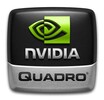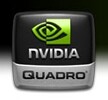NVIDIA Quadro NVS 160M vs NVIDIA Quadro NVS 120M vs NVIDIA Quadro NVS 135M
NVIDIA Quadro NVS 160M
► remove from comparison
The Nvidia Quadro NVS 150M is a business graphics adapater for notebooks. It is based on the GeForce 9300M GS consumer graphics card but features special drivers which are optimized for business applications. A short list of the applications which are certified for the NVS line can be found here (including MS Office, Exceed, Notes, McAffee, pcAnywhere, Bloomberg, Reuters, Tradestation).
The gaming performance should be similar to the GeForce 9300M GS and therefore only suited for less demanding games with low details. Still the business drivers are not optimized for games and may therefore show a worse performance (or some bugs). The memory is clocked either with 700 MHz (DDR3) or 400 MHz (DDR2) which is noticable slower.
Compared to the Quadro NVS 150M, the 160M features a higher clock speed and supports higher resolutions up to 1920x1200 (digital) or 2048x1536 (analog).
As the 9300M GS, the Quadro NVS 160M also supports PureVideo HD to decode HD videos with the graphics chip (and save current).
NVIDIA Quadro NVS 120M
► remove from comparison
It is based on the GeForce Go 7400 with professional certified graphics drivers for applications like CAD, Rendering, 3D modelling, etc. The usability for games is limited.
NVIDIA Quadro NVS 135M
► remove from comparisonBusiness graphics card based on the GeForce 8400M GS. Drivers and Bios are optimized for stability and business applications. The features are similar to the 8400M series.
| NVIDIA Quadro NVS 160M | NVIDIA Quadro NVS 120M | NVIDIA Quadro NVS 135M | |||||||||||||||||||||||||||||||||||||||||||||||||||||||||||||||||||||||||||||||||||||||||||
| Quadro NVS Series |
|
|
| ||||||||||||||||||||||||||||||||||||||||||||||||||||||||||||||||||||||||||||||||||||||||||
| Pipelines | 8 - unified | 4 / 3 Pixel- / Vertexshader | 16 - unified | ||||||||||||||||||||||||||||||||||||||||||||||||||||||||||||||||||||||||||||||||||||||||||
| Core Speed | 580 MHz | 450 MHz | 400 MHz | ||||||||||||||||||||||||||||||||||||||||||||||||||||||||||||||||||||||||||||||||||||||||||
| Shader Speed | 1450 MHz | 800 MHz | |||||||||||||||||||||||||||||||||||||||||||||||||||||||||||||||||||||||||||||||||||||||||||
| Memory Speed | 700 MHz | 700 MHz | 600 MHz | ||||||||||||||||||||||||||||||||||||||||||||||||||||||||||||||||||||||||||||||||||||||||||
| Memory Bus Width | 64 Bit | 64 Bit | 64 Bit | ||||||||||||||||||||||||||||||||||||||||||||||||||||||||||||||||||||||||||||||||||||||||||
| Memory Type | GDDR2, GDDR3 | DDR-3 | GDDR3, GDDR2 | ||||||||||||||||||||||||||||||||||||||||||||||||||||||||||||||||||||||||||||||||||||||||||
| Max. Amount of Memory | 256 MB | 256 MB | 256 MB | ||||||||||||||||||||||||||||||||||||||||||||||||||||||||||||||||||||||||||||||||||||||||||
| Shared Memory | no | no | yes | ||||||||||||||||||||||||||||||||||||||||||||||||||||||||||||||||||||||||||||||||||||||||||
| API | DirectX 10, Shader 4.0 | DirectX 9c, Shader 3.0 | DirectX 10, Shader 4.0 | ||||||||||||||||||||||||||||||||||||||||||||||||||||||||||||||||||||||||||||||||||||||||||
| Power Consumption | 12 Watt | 10 Watt | 10 Watt | ||||||||||||||||||||||||||||||||||||||||||||||||||||||||||||||||||||||||||||||||||||||||||
| technology | 65 nm | 90 nm | 80 nm | ||||||||||||||||||||||||||||||||||||||||||||||||||||||||||||||||||||||||||||||||||||||||||
| Date of Announcement | 15.08.2008 | 01.06.2006 | 09.05.2007 | ||||||||||||||||||||||||||||||||||||||||||||||||||||||||||||||||||||||||||||||||||||||||||
| Information | OpenGL 2.1, max. 1920x1200 (digital) bzw 2048x1536 (analog), max. 2 unabhängige Displays, PCI-Express x16, optionale Interfaces (des Chips): DP, VGA, DVI, LVDS, HDMI | 90nm, 112 Mio Transistoren, PCI-E | |||||||||||||||||||||||||||||||||||||||||||||||||||||||||||||||||||||||||||||||||||||||||||
| Link to Manufacturer Page | www.nvidia.com | www.nvidia.com | www.nvidia.com | ||||||||||||||||||||||||||||||||||||||||||||||||||||||||||||||||||||||||||||||||||||||||||
| Codename | G72M | G86M | |||||||||||||||||||||||||||||||||||||||||||||||||||||||||||||||||||||||||||||||||||||||||||
| Transistors | 112 Million | 210 Million | |||||||||||||||||||||||||||||||||||||||||||||||||||||||||||||||||||||||||||||||||||||||||||
| Features | PureVideo, UltraShadow II, Intellisample 4.0, CineFX 4.0, PowerMizer 6.0, High Dynamic-Range (HDR) Lighning | VGA, DVI, LVDS, HDTV, HDMI, max 2, nView, PCI-e 16x |
Benchmarks
Average Benchmarks NVIDIA Quadro NVS 160M → 100% n=2
Average Benchmarks NVIDIA Quadro NVS 120M → 59% n=2
Average Benchmarks NVIDIA Quadro NVS 135M → 57% n=2
* Smaller numbers mean a higher performance
1 This benchmark is not used for the average calculation
Game Benchmarks
The following benchmarks stem from our benchmarks of review laptops. The performance depends on the used graphics memory, clock rate, processor, system settings, drivers, and operating systems. So the results don't have to be representative for all laptops with this GPU. For detailed information on the benchmark results, click on the fps number.
Average Gaming NVIDIA Quadro NVS 160M → 100%
Average Gaming 30-70 fps → 100%
| NVIDIA Quadro NVS 160M | NVIDIA Quadro NVS 120M | NVIDIA Quadro NVS 135M | |||||||||||||||||||
|---|---|---|---|---|---|---|---|---|---|---|---|---|---|---|---|---|---|---|---|---|---|
| low | med. | high | ultra | QHD | 4K | low | med. | high | ultra | QHD | 4K | low | med. | high | ultra | QHD | 4K | ||||
| F.E.A.R. | 297 | 58 | 13 | ||||||||||||||||||
| Doom 3 | 106.4 | 106.6 | 78.5 | 49.8 | |||||||||||||||||
| Quake 3 Arena - Timedemo | 210.7 | ||||||||||||||||||||
| NVIDIA Quadro NVS 160M | NVIDIA Quadro NVS 120M | NVIDIA Quadro NVS 135M | |||||||||||||||||||
| low | med. | high | ultra | QHD | 4K | low | med. | high | ultra | QHD | 4K | low | med. | high | ultra | QHD | 4K | < 30 fps < 60 fps < 120 fps ≥ 120 fps | 1 1 | 1 1 | 1 1 1 | 1 | | | < 30 fps < 60 fps < 120 fps ≥ 120 fps | | | | | | | < 30 fps < 60 fps < 120 fps ≥ 120 fps | | | | | | |
For more games that might be playable and a list of all games and graphics cards visit our Gaming List














